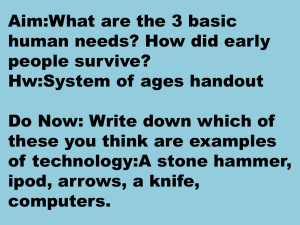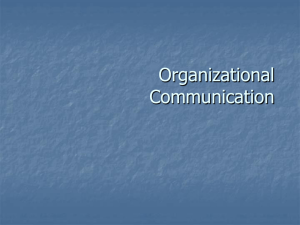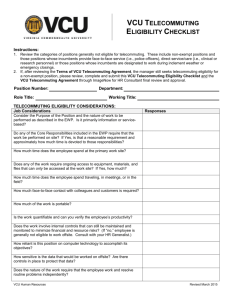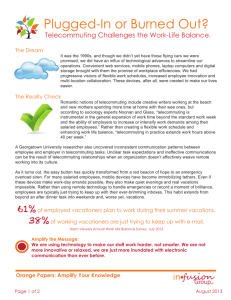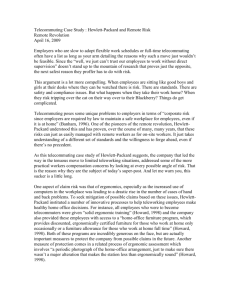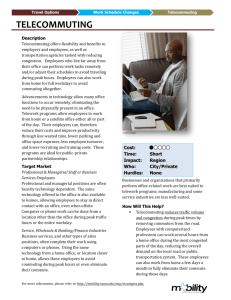Chapter 18.1
advertisement
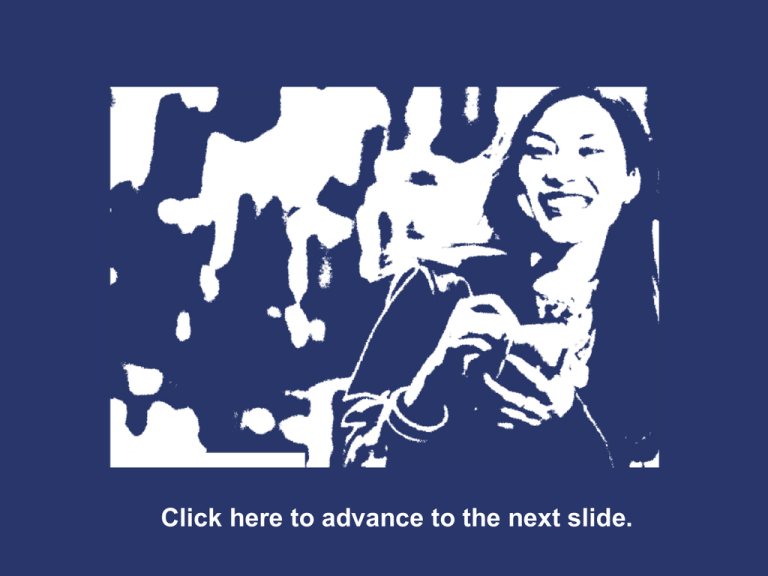
Click here to advance to the next slide. Chapter 18 Technology in the Workplace Section 18.1 Information Technology Read to Learn Describe the role of information technology in business. Identify ways that technology has changed in the workplace. The Main Idea People want instant access to information. At home and at work, they use hardware and software to create, store, and communicate information. Information technology allows people to access information from anywhere. Key Concepts The Role of Information Technology How Technology Has Changed the Workplace Key Terms technology that uses computing, electronics, and information telecommunications to process technology (IT) and distribute information in digital and other forms Key Terms telecommunications the transmission of information over communication lines Key Terms telecommuting an arrangement that allows employees to work at home while communicating with the workplace by phone, fax, or modem Key Terms wearable computers a small portable computer designed to be used while it is worn on the body computer-aided software for designing products with a computer design (CAD) Key Terms virtual reality an artificial, three-dimensional visual world created by a computer The Role of Information Technology Computers are an important part of information technology (IT). information technology (IT) technology that uses computing, electronics, and telecommunications to process and distribute information in digital and other forms Graphic Organizer Information Technology (IT) Computers Telephones Fax Machines MP3 Players Personal Digital Assistants (PDAs) Wireless Technology (WiFi) The Role of Information Technology People depend on telecommunications for getting information quickly and easily. telecommunications the transmission of information over communication lines How Technology Has Changed the Workplace In the past, computers were too big and heavy to take from the office. Today, mobile computers are light enough to take anywhere. Graphic Organizer Wearable Computers Portable Computers Wireless Phones Technology On the Go Specialized Software Broadband Access E-Mail Open-Source Systems An operating system is the basic set of programs and utilities that makes your computer run. Users can modify and redistribute open-source operating systems such as Linux®. Telecommuting Telecommuting requires that employees have their own computers and other equipment to do their work. telecommuting an arrangement that allows employees to work at home while communicating with the workplace by phone, fax, or modem Graphic Organizer Advantages of Telecommuting Decreased traffic Flexible work hours Improved quality of work Fewer absent days Graphic Organizer Disadvantages of Telecommuting Less contact with other workers Distractions of home Supervisors find it more difficult to supervise workers Equipment expenses Figure 18.1 Computer Users by Age Group Wearable Computers A portable music player that can also record speech is an example of a wearable computer. wearable computer a small portable computer designed to be used while it is worn on the body Technology in Manufacturing By using computeraided-design (CAD) and computer-aided manufacturing (CAM) programs, companies can custom design and make products. computer-aided design (CAD) software for designing products with a computer Technology in Manufacturing In manufacturing plants, robots and computer-controlled machines do much of the work. Workers direct the robots and machine tools instead of doing hard or monotonous jobs. Electronic Information Transfer Using an automated teller machine (ATM) to transfer funds from one bank account to another is an example of an electronic funds transfer. Electronic Information Transfer Many companies electronically transfer paychecks to employees’ bank accounts. Virtual Training Virtual training allows people to simulate a real situation using a computer. Computer-run flight simulation programs allow pilots to learn how to fly aircraft. Virtual Training Virtual reality is used in training. In a virtual world, the computer recreates places and actions that seem real. virtual reality an artificial, threedimensional world created by a computer Virtual Training Special goggles and data gloves give users the illusion of real object or places. In medical training, computers allow surgeons to practice proceedures without real patients. 1. What are some forms of information technology? computers, telephones, PDAs 2. How has technology, especially mobile technology, changed the workplace? making it possible to work outside the office, especially from home 3. What are some of the pros and cons of telecommuting? pros: work at home, work without physical supervision, less travel time, flexible work hours; cons: lack of contact with co-workers, distractions, problems in supervision, cost of equipment End of Chapter 18 Technology in the Workplace Section 18.1 Information Technology



